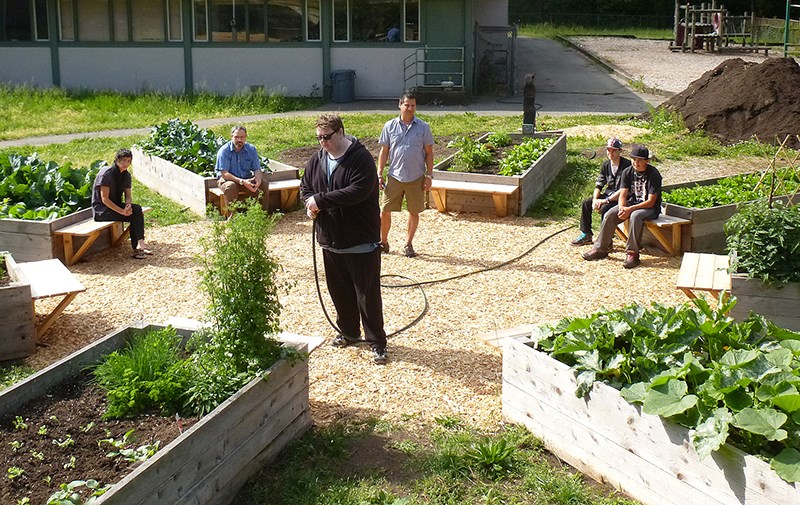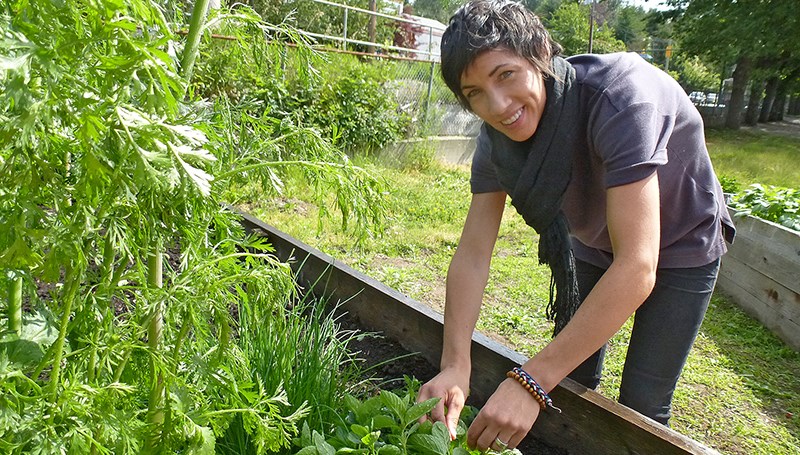An ambitious horticultural project is under construction in a Coquitlam school that its proponents say could one day be the basis of a college certificate program to teach students job-ready skills.
Today, a medicine wheel garden with traditional plants and berries along with vegetables is taking shape outside the former Millside elementary school in Maillardville — now the home of School District 43's Suwalk'h alternative school and Inquiry Hub.
But the next phase of the project could see the establishment of a greenhouse to give students year-round access to growing and harvesting, and possibly connections with local colleges, garden centres and other agencies to offer a rich educational experience.
"It's about giving them work experience, teaching them empathy when they share food with each other and the local food bank," said Phillipe Brulot, the district's principal of aboriginal education.
Under construction for some months with donated materials and plants, as well as seed money from Vancity, the garden is now abundant with healthy vegetables.
"I like looking after the plants," said Cody McKay, a Grade 12 Suwalk'h student.

Pierce Cunningham and Johnny Martell made similar comments, noting that it's good to get outdoors and away from classroom lessons.
The Suwalk'h program has been around for about four years and in that time, has seen a growth in the number of students, with about 50 kids in Grade 6 to 12. The program embeds First Nations teachings in the curriculum, classes are small and students study at their own pace. There is also an outdoor component, where students are encouraged to participate in hikes and even go on fall and winter camping trips with Outward Bound.
Malcolm Key, SD43's aboriginal community schools co-ordinator, said the medicine wheel garden is important because it teaches aboriginal students about their heritage.
Formed in the shape of a circle, it has an eastern "gateway" marked by the colour yellow in the form of a box of marigolds, and the other three directions are also marked with flowers of varying colours: white for north, red pansies for south and black pansies for west.
"These colours represent all the nations of the world," Key explained, adding that the garden brings students closer to the land, important for their spiritual development.
Teacher Natasha Pellatt said the garden has herbs that are used in native healing and cleansing, such as sage, tobacco and sweetgrass. The garden will also grow native salmon berries and kinnikinnick berries that are used medicinally.
"We want the kids to come outside and have a sense of ownership," said Pellatt, as she picks some sprigs of mint.
In the summer, kids from the Red Wolf camp will water and look after the garden, the teachers say.
Brulot said he wants to create a community space where people come together to share stories and knowledge, as well as food, to give young people a clearer idea of where they fit in the world.
"We want to show them the relationship between everything," Brulot said.
ITEMS NEEDED
The following items are needed fir the medicine wheel garden at the former Millside elementary. If you can help, email [email protected]:
• cedar wood;
• wheelbarrows;
• power tools: cordless drill set;
• garden tools: rakes, shovels, etc.;
• garden tool shed for our supplies and/or metal shipping container (10x10);
• a composter;
• fruit trees and other trees;
• rain barrels;
• electric water pump.



